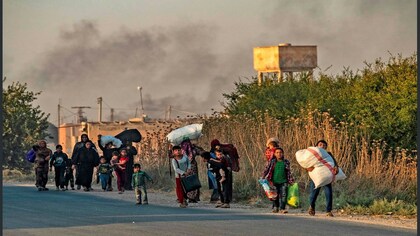Ordinary Iranians Bear Brunt of Sanctions
19:27 - 12 February 2012

International sanctions targeting Iran\'s oil exports are inflicting economic pain but may well fail to force Tehran to compromise on its nuclear ambitions and could even make the regime more intransigent, analysts said.
The unprecedented measures could also boomerang by driving up oil prices, hitting the jittery global economy, they said.
\"In the process of hunting for alternative sources to Iranian oil, it\'s virtually certain that the price of oil is going to rise,\" said Gary Sick, an Iran expert and former White House policy adviser at Columbia University in New York.
Ordinary Iranians complain that they, rather than their defiant and resilient regime, are bearing the brunt of sanctions that are compounding problems caused by the government\'s economic mismanagement.
US financial sanctions imposed at the beginning of this year are playing havoc with Iran\'s ability to receive payments for its oil exports. But they are also causing serious disruption to Tehran\'s
imports, with a real effect on the Iranian street where prices for basic foodstuffs are soaring. Malaysian exporters of palm oil, critical to Iran\'s food industry, have halted sales to Tehran because they could not get paid.
A margarine factory owner in Iran told Reuters: \"The way things are going, I predict that over the next three to four months our edible oil will run out because of sanctions.\"
A default by Iranian buyers on purchases of 200,000 tonnes of Indian rice is potentially more crippling, and imports of tea from India, Iran\'s favourite beverage, are facing similar payment hurdles. Iran, meanwhile, is reportedly seeking to close grain purchases using gold and oil as payment.
The Iranian rial has lost half its value against the dollar in recent weeks. The official inflation rate stands at 20 per cent but it is thought to be much higher, and the same applies to the official unemployment rate of 14.6 per cent.
With the rial plummeting, the price of rice, a main dietary staple of Iran\'s 74 million people, has more than doubled in a year to $5 a kilo. The cost of meat has almost tripled to about $30 a kilo, beyond the budget of many middle-class families.
The stated aim of the US sanctions and a European Union embargo on imports of Iranian oil, effective from July, was to force Iran back to the negotiating table, paving the way for a diplomatic solution to the crisis. Iran does not see it that way. It believes the sanctions are aimed at inciting domestic upheaval.
\"By going after the jugular of the Iranian economy, the Obama administration is giving signals, intentionally or unintentionally, that it is going for the collapse of the Iranian economy and eventually the regime,\" said Farideh Farhi, an Iran expert at the University of Hawaii. \"With this ambiguity … Iran\'s leadership has zero incentive to negotiate,\" she told The National.
A seemingly confident Tehran has shrugged off the sanctions as \"psychological warfare and propaganda\" that it says will have no effect on its nuclear programme. Iran\'s own propagandists say that the sanctions will even be beneficial, arguing they will reduce imports and create 200,000 new jobs by boosting domestic manufacturing.
Despite Iran\'s bravado, analysts believe its room to manoeuvre is fast shrinking.
\"The last thing they want is the pressure of sanctions influencing domestic politics in the run-up to parliamentary elections\" on March 2, Anoush Ehteshami, an Iran expert at Durham University in England, said in an interview.
Iran and the West are gearing up for a new round of nuclear talks, but each is hampered by having set maximum positions that make it politically difficult for either to make concessions. How the sanctions will influence the decisions of Iran\'s fractious ruling hardliners is a moot point.
\"They will boost the intransigence of the intransigent and encourage those who wish at least to explore diplomacy to emphasise the need to explore diplomacy,\" said Sir Richard Dalton, a British former ambassador to Iran and fellow at Chatham House, a British think tank. \"But the leadership in Iran seems to be veering towards the intransigent,\" he said, referring to remarks last week by Iran\'s supreme leader, Ayatollah Ali Khamenei.
The ayatollah vowed that \"crippling sanctions\" would never force Tehran to \"retreat\" on its nuclear programme, which it insists is solely peaceful in nature. The strengths of Iran\'s relatively self-reliant if troubled economy suggest that, as long as Iran can find buyers for much of its oil, it will be able to limp along.
\"Iran can probably survive sanctions,\" said a European diplomat who recently returned from Tehran.
China and Russia, which already take a combined 34 per cent of Iran\'s oil exports, have signalled they will not cut back. Such countries are expected to end up buying most or all of the Iranian oil rejected by the EU embargo. But they will demand discounts.
China has cut its imports by more than half over the first three months of this year while pressing Iran to reduce its price. Selling its oil at a 10 to 15 per cent discount would be a heavy but not crippling blow to Iran\'s US$480 billion (Dh1.7603tr) economy.
Gary Hufbauer, a former US Treasury official and sanctions expert, estimated that at most, the sanctions would cut Iran\'s GDP by 10 per cent. \"Iran can still scrape by,\" he told Reuters.
If Iran succeeds in finding other buyers for its oil, \"then sanctions won\'t really work,\" Mr Sick said. \"Meanwhile, countries like Greece, Italy and Spain which get Iranian oil at a discount won\'t be able to replace those supplies at the same price.\"
The history of sanctions against other countries such as Saddam Hussein\'s Iraq and Cuba augurs badly for similar coercive action against Iran.
\"Iran itself has absorbed very great pressures since the time of the 1979 Islamic revolution,\" Mr Sick said. \"I\'m sceptical that they will now force Iran to basically surrender.\"
Source – The National
By: Michael Theodoulou
The unprecedented measures could also boomerang by driving up oil prices, hitting the jittery global economy, they said.
\"In the process of hunting for alternative sources to Iranian oil, it\'s virtually certain that the price of oil is going to rise,\" said Gary Sick, an Iran expert and former White House policy adviser at Columbia University in New York.
Ordinary Iranians complain that they, rather than their defiant and resilient regime, are bearing the brunt of sanctions that are compounding problems caused by the government\'s economic mismanagement.
US financial sanctions imposed at the beginning of this year are playing havoc with Iran\'s ability to receive payments for its oil exports. But they are also causing serious disruption to Tehran\'s
imports, with a real effect on the Iranian street where prices for basic foodstuffs are soaring. Malaysian exporters of palm oil, critical to Iran\'s food industry, have halted sales to Tehran because they could not get paid.
A margarine factory owner in Iran told Reuters: \"The way things are going, I predict that over the next three to four months our edible oil will run out because of sanctions.\"
A default by Iranian buyers on purchases of 200,000 tonnes of Indian rice is potentially more crippling, and imports of tea from India, Iran\'s favourite beverage, are facing similar payment hurdles. Iran, meanwhile, is reportedly seeking to close grain purchases using gold and oil as payment.
The Iranian rial has lost half its value against the dollar in recent weeks. The official inflation rate stands at 20 per cent but it is thought to be much higher, and the same applies to the official unemployment rate of 14.6 per cent.
With the rial plummeting, the price of rice, a main dietary staple of Iran\'s 74 million people, has more than doubled in a year to $5 a kilo. The cost of meat has almost tripled to about $30 a kilo, beyond the budget of many middle-class families.
The stated aim of the US sanctions and a European Union embargo on imports of Iranian oil, effective from July, was to force Iran back to the negotiating table, paving the way for a diplomatic solution to the crisis. Iran does not see it that way. It believes the sanctions are aimed at inciting domestic upheaval.
\"By going after the jugular of the Iranian economy, the Obama administration is giving signals, intentionally or unintentionally, that it is going for the collapse of the Iranian economy and eventually the regime,\" said Farideh Farhi, an Iran expert at the University of Hawaii. \"With this ambiguity … Iran\'s leadership has zero incentive to negotiate,\" she told The National.
A seemingly confident Tehran has shrugged off the sanctions as \"psychological warfare and propaganda\" that it says will have no effect on its nuclear programme. Iran\'s own propagandists say that the sanctions will even be beneficial, arguing they will reduce imports and create 200,000 new jobs by boosting domestic manufacturing.
Despite Iran\'s bravado, analysts believe its room to manoeuvre is fast shrinking.
\"The last thing they want is the pressure of sanctions influencing domestic politics in the run-up to parliamentary elections\" on March 2, Anoush Ehteshami, an Iran expert at Durham University in England, said in an interview.
Iran and the West are gearing up for a new round of nuclear talks, but each is hampered by having set maximum positions that make it politically difficult for either to make concessions. How the sanctions will influence the decisions of Iran\'s fractious ruling hardliners is a moot point.
\"They will boost the intransigence of the intransigent and encourage those who wish at least to explore diplomacy to emphasise the need to explore diplomacy,\" said Sir Richard Dalton, a British former ambassador to Iran and fellow at Chatham House, a British think tank. \"But the leadership in Iran seems to be veering towards the intransigent,\" he said, referring to remarks last week by Iran\'s supreme leader, Ayatollah Ali Khamenei.
The ayatollah vowed that \"crippling sanctions\" would never force Tehran to \"retreat\" on its nuclear programme, which it insists is solely peaceful in nature. The strengths of Iran\'s relatively self-reliant if troubled economy suggest that, as long as Iran can find buyers for much of its oil, it will be able to limp along.
\"Iran can probably survive sanctions,\" said a European diplomat who recently returned from Tehran.
China and Russia, which already take a combined 34 per cent of Iran\'s oil exports, have signalled they will not cut back. Such countries are expected to end up buying most or all of the Iranian oil rejected by the EU embargo. But they will demand discounts.
China has cut its imports by more than half over the first three months of this year while pressing Iran to reduce its price. Selling its oil at a 10 to 15 per cent discount would be a heavy but not crippling blow to Iran\'s US$480 billion (Dh1.7603tr) economy.
Gary Hufbauer, a former US Treasury official and sanctions expert, estimated that at most, the sanctions would cut Iran\'s GDP by 10 per cent. \"Iran can still scrape by,\" he told Reuters.
If Iran succeeds in finding other buyers for its oil, \"then sanctions won\'t really work,\" Mr Sick said. \"Meanwhile, countries like Greece, Italy and Spain which get Iranian oil at a discount won\'t be able to replace those supplies at the same price.\"
The history of sanctions against other countries such as Saddam Hussein\'s Iraq and Cuba augurs badly for similar coercive action against Iran.
\"Iran itself has absorbed very great pressures since the time of the 1979 Islamic revolution,\" Mr Sick said. \"I\'m sceptical that they will now force Iran to basically surrender.\"
Source – The National
By: Michael Theodoulou



